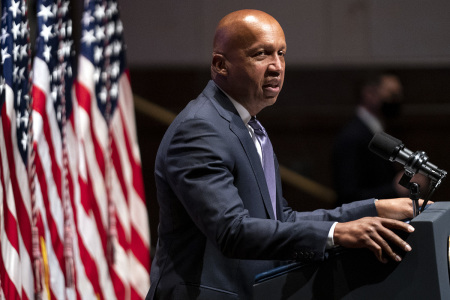National Prayer Breakfast speaker warns Biden, lawmakers not to govern with 'fear and anger'

The founder of a national criminal justice reform advocacy organization implored politicians gathered for the National Prayer Breakfast Thursday morning to “embrace all of God’s children” and not just the ones that they agree with as they seek to promote justice and mercy.
As the keynote speaker, Bryan Stevenson, the founder and director of the Equal Justice Initiative, addressed President Joe Biden, Vice President Kamala Harris and members of Congress attending the 70th annual National Prayer Breakfast at the National Capitol Visitor Center in Washington, D.C.
This year’s National Prayer Breakfast is the first to take place as an in-person gathering since the coronavirus pandemic began nearly two years ago.
Stevenson highlighted the need for people of faith to “embrace one another, to affirm each other’s humanity, to affirm each other’s dignity.”
Stevenson emphasized that “you don’t just show God’s love by embracing those with whom you agree,” adding “we have to embrace all of God’s children.”
“What’s missing when we try to do justice is our willingness to sometimes just be present with people who are struggling and suffering and to embrace them, to show God’s love in a meaningful way that affirms their humanity and dignity," he said.
He warned that “we won’t be doing it effectively if we also don’t talk about the narratives that create separation.”
Stevenson expressed concern about “the narratives that are in our world right now.”
He cited “fear and anger,” maintaining that “when people allow themselves to be governed by fear and anger, they start tolerating things they should never tolerate” and “start accepting things they should never accept.”
When introducing Stevenson, Sen. Chris Coons, D-Del., noted that the advocate “has dedicated his life to representing criminal defendants” through the Equal Justice Initiative, which provides “free legal services to the unjustly convicted.”
“Thanks to his work, at least 125 Americans have been spared the death penalty,” Coons said. Stevenson is the author of the book Just Mercy, which was later made into a movie.
The activist also spearheaded the creation of the National Memorial for Peace and Justice, which opened in Montgomery, Alabama, in 2018. Coons said the memorial serves as a “national monument to the terror of lynching” as part of a broader effort at “reconciling and repairing the harms of decades of domestic terrorism rooted in racism.”
Coons also mentioned that the Equal Justice Initiative opened the Legacy Museum in Montgomery last year, confronting the history of racial inequality from slavery to modern-day mass incarceration.”
Stevenson discussed the negative impact of the coronavirus pandemic and asked those in attendance: “What does God require from us in this moment?” He shared a quote from Micah, who declared that “What God requires is that we do justice, that we love mercy and that we walk humbly.”
“What I believe that doing justice requires is that we get proximate, get closer to those who are experiencing injustice,” he declared. “We cannot do justice if we are unwilling to go to the places where cruelty and oppression are manifest, where abuse of power is manifest, where suffering is manifest.”
“It’s in proximity to those who are excluded and neglected, those who are suffering, that we begin to hear things that we won’t otherwise hear ... [and] see things that we won’t otherwise see,” he added. “We have a shared humanity that compels us to stay close to one another. People of faith have a powerful role in modeling what it means to be proximate, to draw near.”
“As people of faith, we cannot be separated. We cannot disconnect from those who suffer,” he continued.
He attributed the fact that the U.S. has the “highest rate of incarceration in the world” to narratives of “fear and anger” surrounding those who are addicted to drugs. Stevenson suggested that rather than view drug addicts as criminals, people should see them as “people who have illnesses that we need to treat.” He condemned all forms of violence for preventing people from “doing justice” and “loving mercy.”
After detailing the examples of racial injustice experienced by his ancestors and African Americans as a whole in the U.S., Stevenson stressed that “people of faith have a critical role to play in leading our nation, leading the world in truth-telling” about the role of race and racism in American history.
“People of faith know that we can talk about these problems and challenges not because we seek punishment but because we seek liberation,” he said.
“The world needs to see modeled that we have the courage of our convictions, the ability to actually talk honestly about our mistakes,” he continued.
Stevenson said that at his church, “You can’t come to church and say, ‘I want salvation and redemption in Heaven but I’m not going to admit to anything, I’m not going to talk about the bad things.’”
He believes that the pastors at his church would tell a person seeking salvation and redemption without repentance that they “shouldn’t fear that because it opens up the hearts and minds that lead to liberation.”
Stevenson implied that the same line of thinking applies to the need for the U.S. to acknowledge its past wrongs on race. He concluded his speech by stating that “doing justice, loving mercy, walking humbly with God means that we have to do things that are uncomfortable; we have to do things that are challenging.”
Ryan Foley is a reporter for The Christian Post. He can be reached at: ryan.foley@christianpost.com





















